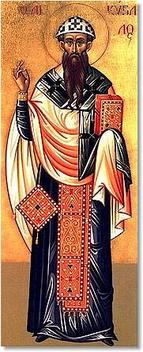
As bishop he endured, like blessed Athanasius, his contemporary, many wrongs and sufferings for the sake of the faith at the hands of the Arians. They could not bear his strenuous opposition to their heresy, and thus assailed him with calumnies, deposed him in a pseudo-council, and drove him from his see. To escape their rage he fled to Tarsus in Cilicia and, as long as Constantius lived, he bore the hardships of exile. On his death, and at the ascension of Julian the Apostate to the empire, Cyril was able to return to Jerusalem, where he set himself, with burning zeal, to deliver his flock from errors and vices. He was driven into exile a second time, under the emperor Valens, but when peace was restored to the Church by Theodosius the Great, and the cruelty and insolence of the Arians were restrained, he was received with honour by the emperor as a most valiant soldier of Christ, and restored to his see. With what earnestness and holiness he fulfilled the duties of his exalted office was proved by the flourishing state of the church at Jerusalem at that time, as described by St. Basil who spent some time there on a pilgrimage to the holy places.
Tradition states that God made the holiness of this venerable prelate illustrious by signs from heaven. Among these is numbered the apparition of a shining cross, brighter than the rays of the sun, which was seen at the beginning of his episcopate. Not only Cyril himself, but pagans and Christians alike were witnesses of this miracle which Cyril, after having given thanks unto God in church, announced by letter to Constantius. A thing no less wonderful came to pass when the Jews were commanded by the impious emperor Julian to restore the Temple which had been destroyed by Titus. A violent earthquake occurred, and great balls of fire burst out of the earth, and consumed all the works, so that Julian and the Jews were struck with terror and gave up their plan; all of which had been clearly foretold by Cyril. A little while before his death, he was present at the ecumenical Council of Constantinople, where the heresies of Macedonius, and, once more, that of Arius were condemned. After his return to Jerusalem, being nearly seventy years old, he died a holy death in the thirty-fifth year of his episcopate. Pope Leo XIII ordered that his Office and Mass should be said throughout the Universal Church.




